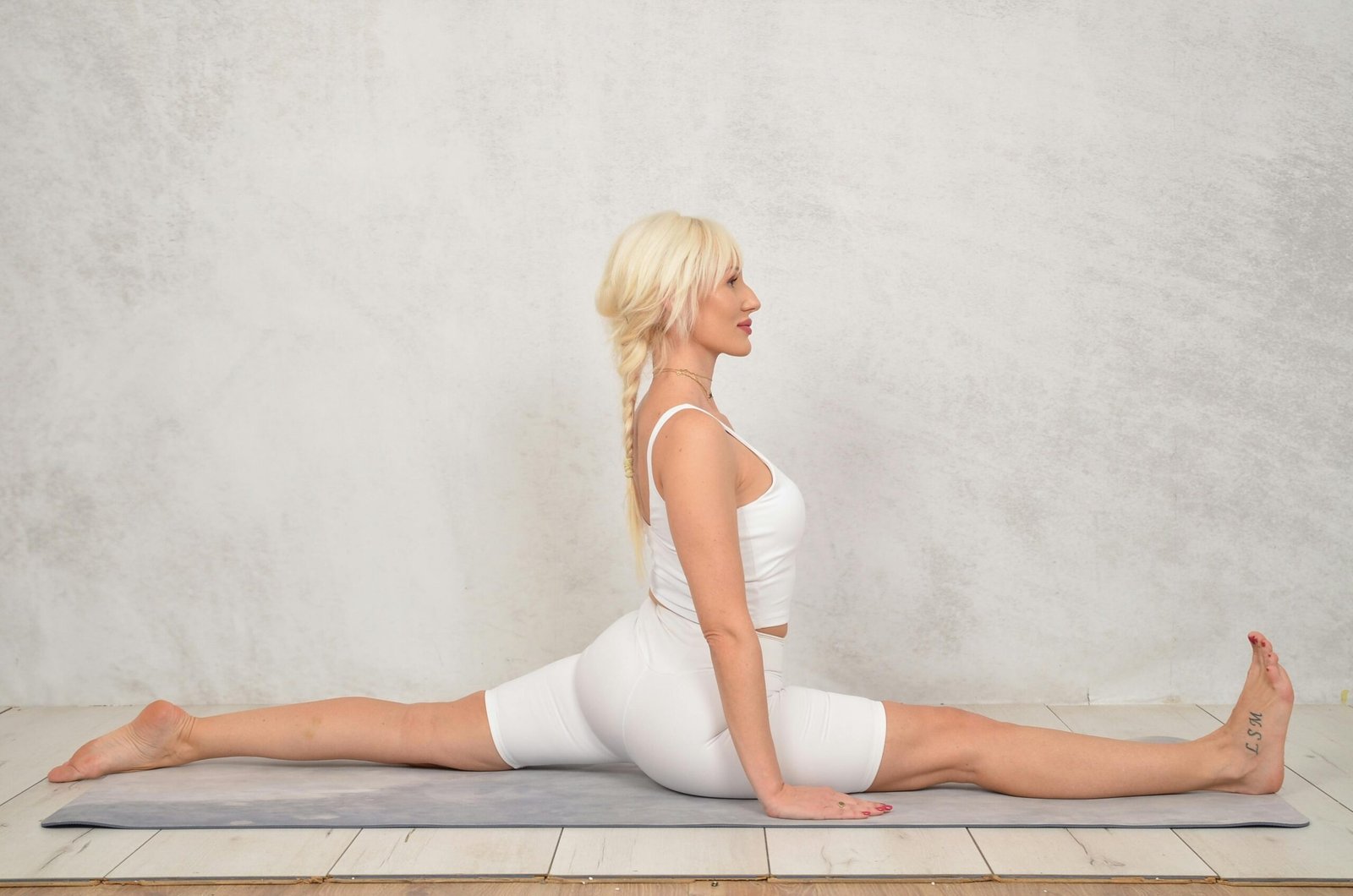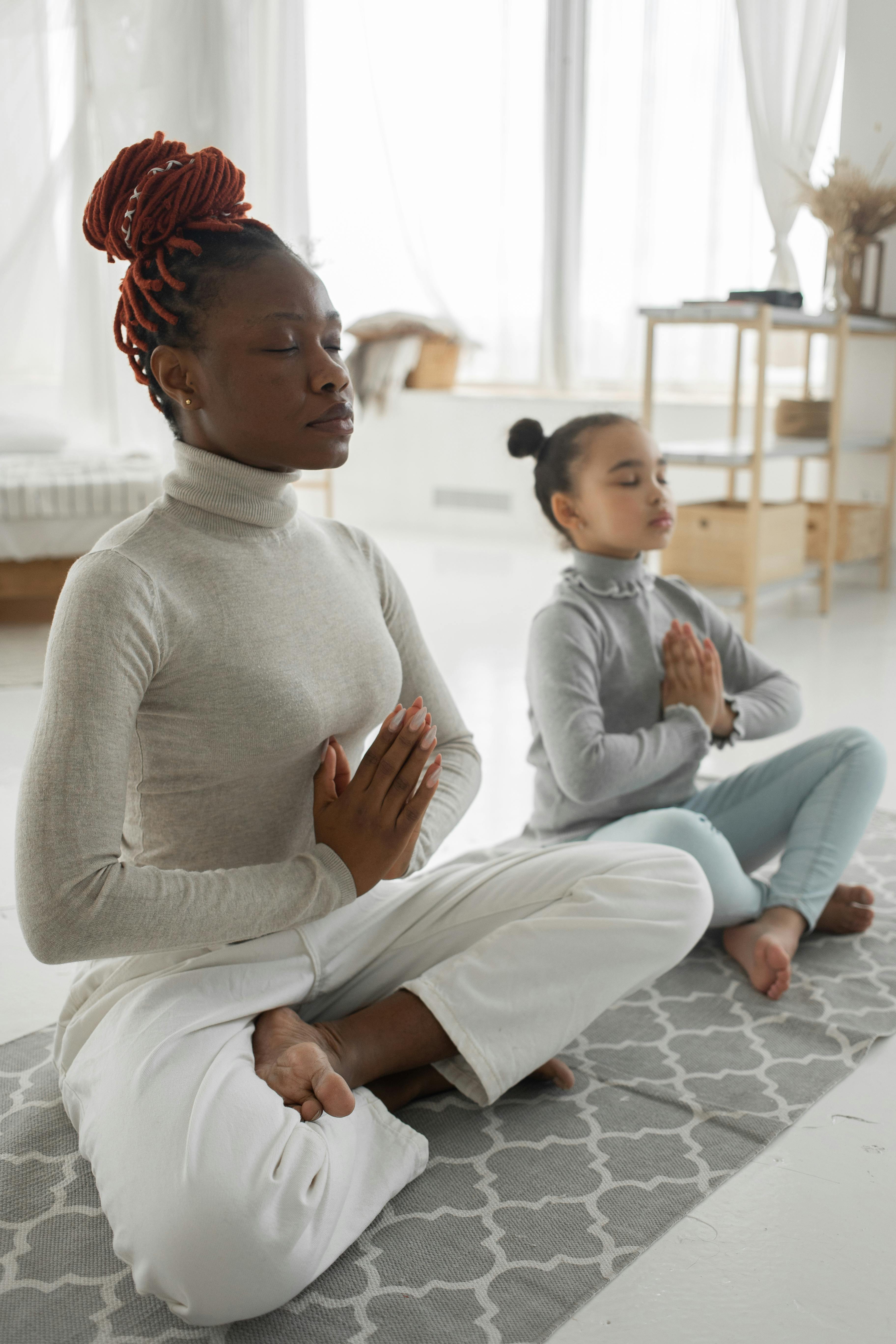Are you looking for a way to enhance your relaxation routine? Consider incorporating yoga into your daily practice. Not only does yoga promote physical strength, flexibility, and balance, but it also has numerous mental and emotional benefits. From reducing stress and anxiety to improving sleep and boosting overall well-being, yoga can be a transformative addition to your relaxation routine. So why not give it a try and experience the positive impact for yourself?

Physical Benefits
Improves flexibility and strength
Incorporating yoga into your relaxation routine can bring about significant improvements in your flexibility and strength. The various yoga poses, also known as asanas, gently stretch and lengthen your muscles, promoting increased flexibility over time. Regularly practicing yoga can help you achieve a greater range of motion and make everyday activities much easier. Furthermore, many yoga poses require you to engage and hold various muscle groups, which helps to build strength and tone your body. So, if you’re looking to improve your flexibility and strengthen your muscles, yoga is the way to go!
Eases muscle tension and pain
If you often find yourself experiencing muscle tension or pain, yoga can be an excellent solution to alleviate these discomforts. Through the practice of gentle stretches and deep breathing, yoga helps to release tension and reduce muscle soreness. Certain poses specifically target areas prone to tension, such as the neck, shoulders, and lower back, allowing you to find relief and relax those tight muscles. Additionally, yoga encourages you to become more aware of your body, enabling you to identify areas of muscle tightness and work on releasing them.
Enhances posture and balance
Maintaining good posture and balance is essential for overall health and well-being. By incorporating yoga into your relaxation routine, you can work towards improving both aspects. Through the practice of various standing and balancing poses, yoga helps to strengthen the core muscles that support your spine and improve your overall posture. Regularly practicing yoga can also enhance proprioception, which is the body’s ability to sense its position in space. This heightened sense of body awareness contributes to improved balance, reducing the risk of falls and injuries.
Increases energy levels
Feeling sluggish and low on energy can hinder your daily activities and productivity. Luckily, yoga can give you the boost you need! The combination of physical movement, deep breathing, and mindfulness in yoga practice helps to increase blood circulation and oxygen supply, resulting in a natural energy boost. Additionally, the relaxation and stress-reducing benefits of yoga can help alleviate fatigue and improve sleep quality, leaving you feeling revitalized and more energetic throughout your day.
Mental Benefits
Reduces stress and anxiety
In today’s fast-paced world, stress and anxiety have become increasingly common. Incorporating yoga into your relaxation routine offers a powerful tool to combat these overwhelming emotions. The meditative aspect of yoga, combined with conscious breathing exercises, triggers the body’s relaxation response and helps to reduce the levels of stress hormones, such as cortisol. Regularly practicing yoga provides you with a safe and calming space to let go of worries, promoting a sense of inner peace and tranquility.
Improves focus and concentration
In a world filled with distractions, it can be challenging to maintain focus and concentration. However, regular yoga practice can sharpen your mental clarity and enhance your ability to stay present. The emphasis on mindful movement and breath control in yoga helps to quiet the mind and bring your attention to the present moment. Over time, this heightened sense of focus and concentration carries over into your daily life, allowing you to tackle tasks with greater efficiency and productivity.
Promotes relaxation and better sleep
Incorporating yoga into your relaxation routine can significantly contribute to achieving a state of deep relaxation and improved sleep. The gentle stretches and soothing movements involved in yoga help to release tension in your body and alleviate the restlessness that often accompanies a busy mind. By practicing yoga before bedtime, you can create a calming routine that signals to your body and mind that it’s time to unwind, making it easier to fall asleep and experience more restful nights.
Boosts mood and self-esteem
Yoga has the power to uplift your mood and boost your self-esteem. Regularly engaging in yoga not only releases endorphins, the “feel-good” hormones, but also helps to regulate other mood-regulating neurotransmitters, such as serotonin. This can result in reduced feelings of depression and anxiety, helping you to experience more positive emotions and an overall improved outlook on life. Additionally, the sense of accomplishment and self-awareness cultivated through yoga practice can enhance your self-esteem and confidence in yourself and your abilities.

Emotional Benefits
Increases self-awareness and mindfulness
One of the greatest emotional benefits of incorporating yoga into your relaxation routine is the increased self-awareness and mindfulness it brings. Yoga encourages you to observe your thoughts and emotions without judgment, creating a space for self-reflection. By becoming more in tune with your mental and emotional state during yoga practice, you can gain valuable insights about yourself, your patterns of thought, and your reactions to different situations. This heightened self-awareness can empower you to make positive changes in your life and develop a greater sense of self-understanding.
Promotes emotional stability
Life can often throw us curveballs, leading to emotional ups and downs. However, yoga can be a valuable tool to promote emotional stability and resilience. Through the practice of yoga, you learn to cultivate a sense of inner calm and balance, allowing you to navigate through challenging emotions more effectively. The combination of physical movement, conscious breathing, and meditation in yoga promotes the release of endorphins and enhances the regulation of stress hormones, which contribute to emotional stability.
Reduces symptoms of depression
Depression can have a significant impact on one’s quality of life, but yoga has shown promise in reducing the symptoms associated with this mental health condition. The practice of yoga stimulates the release of serotonin, a neurotransmitter known to improve mood and reduce feelings of depression. Additionally, the mindfulness aspect of yoga helps individuals connect with their emotions, making it easier to identify and address negative thought patterns. By incorporating yoga into your relaxation routine, you can take an active role in managing and reducing the symptoms of depression.
Enhances emotional well-being
Incorporating yoga into your relaxation routine can have a profound impact on your overall emotional well-being. The combination of physical movement, deep breathing, meditation, and self-reflection practiced in yoga helps to release emotional blockages and cultivate a greater sense of inner peace. The feeling of being fully present in each moment during yoga allows you to let go of worries about the past or future, promoting a state of contentment and emotional balance. Regularly engaging in yoga opens the door to a deeper connection with yourself and a greater appreciation for the beauty of life.
Social Benefits
Creates a sense of community
While yoga is often perceived as an individual practice, it also offers opportunities to foster a sense of community. Attending group yoga classes provides a space where individuals with common interests come together to support and inspire one another on their wellness journeys. Engaging in yoga within a community setting allows you to connect with like-minded individuals, fostering a sense of belonging and creating valuable social connections.
Provides opportunities for social interaction
Incorporating yoga into your relaxation routine offers a chance to engage in social interactions. Attending group classes or joining yoga retreats allows you to connect with fellow yoga enthusiasts and share experiences. These interactions not only provide a sense of camaraderie but also provide opportunities for personal growth and learning from others. Engaging in conversations about yoga, wellness, and mindfulness can deepen your understanding of the practice and offer different perspectives.
Improves relationships and communication
Yoga can positively impact your relationships with others by improving your communication skills and emotional intelligence. The practice of mindfulness and self-awareness in yoga teaches you to become more present and attentive to your own thoughts and emotions. This heightened awareness extends beyond your personal practice and into your relationships, allowing you to be more empathetic and compassionate towards others. By cultivating these qualities through yoga, you can enhance your relationships and build more meaningful connections with those around you.
Encourages compassion and empathy
Incorporating yoga into your relaxation routine can help nurture qualities of compassion and empathy within you. Yoga teaches you the importance of non-judgment and acceptance, not only towards yourself but also towards others. Through regular practice, you become more attuned to the interconnectedness of all living beings, fostering a sense of empathy and understanding. These qualities can positively impact your interactions with others and inspire acts of kindness and compassion both on and off the yoga mat.

Physical Health Benefits
Improves cardiovascular health
Engaging in regular yoga practice can have a positive impact on your cardiovascular health. The combination of gentle stretches, mindful movement, and controlled breathing in yoga helps to improve blood circulation throughout your body. This increased circulation helps deliver oxygen and nutrients to your muscles and organs, promoting their optimal function. Regular yoga practice can also help lower blood pressure and reduce the risk of developing heart-related conditions, such as heart disease.
Increases respiratory capacity
Deep and controlled breathing is a fundamental aspect of yoga. Through the practice of specific breathing techniques, known as pranayama, yoga helps to increase your respiratory capacity. This means that you can take in more oxygen with each breath, improving the efficiency of your respiratory system. With increased respiratory capacity, you’ll feel more energized and less fatigued during physical activities and daily tasks.
Boosts immune system
Maintaining a strong immune system is crucial for warding off illnesses and infections. Yoga can help give your immune system a boost through its stress-reducing effects. Chronic stress weakens the immune system, making you more susceptible to illnesses. By regularly practicing yoga and reducing stress levels, you can help your immune system function at its best. Additionally, some yoga poses, such as inversions and twists, stimulate and massage the lymphatic system, which plays a vital role in immune function.
Regulates metabolism and weight
If you’re looking to manage your weight or boost your metabolism, incorporating yoga into your relaxation routine can be immensely beneficial. As you engage in yoga, you’re engaging in physical movement that helps to stimulate and regulate your metabolism. Yoga also supports healthy digestion and elimination, ensuring that your body can efficiently process and absorb nutrients. The combination of increased physical activity, improved digestion, and stress reduction can contribute to maintaining a healthy weight.
Mental Health Benefits
Reduces symptoms of PTSD
For individuals experiencing post-traumatic stress disorder (PTSD), yoga has been shown to be a valuable complementary therapy. The practice of yoga combines physical movement, conscious breathing, and meditation, which work together to regulate the nervous system and promote a sense of calm. By fostering a safe and supportive environment, yoga provides individuals with PTSD an opportunity to reconnect with their bodies and regain a sense of control over their thoughts and emotions. Over time, regular yoga practice can help reduce the symptoms of PTSD and promote healing.
Improves mental resilience
Life is full of challenges and setbacks, but incorporating yoga into your relaxation routine can help you develop greater mental resilience. Through the practice of yoga, you learn to approach difficulties with a mindset of acceptance and non-judgment. The mindfulness and self-awareness cultivated in yoga provide you with the tools to observe your thoughts and emotions without being overwhelmed by them. This ability to stay present and resilient in the face of adversity can greatly enhance your overall mental well-being.
Alleviates symptoms of ADHD
Attention deficit hyperactivity disorder (ADHD) can significantly impact an individual’s ability to focus and stay present. Yoga can offer a drug-free and holistic approach to managing the symptoms associated with ADHD. The practice of yoga incorporates physical movement and deep breathing, which help to calm the nervous system and improve focus. The mindfulness aspect of yoga also trains the mind to become more aware of distractions and develop strategies to redirect attention. Incorporating yoga into your relaxation routine can provide you with techniques to better manage the symptoms of ADHD and improve your overall well-being.
Enhances cognitive function
Incorporating yoga into your relaxation routine can have a positive impact on your cognitive function. The combination of physical movement, focused attention, and controlled breathing in yoga helps to improve blood flow to the brain, thereby enhancing cognitive abilities. Regular practice has been shown to improve memory, attention span, and problem-solving skills. Additionally, the relaxation and stress reduction offered by yoga consolidate learning and aid in information retention. By incorporating yoga into your routine, you can enhance your cognitive function and support your mental clarity.
Spiritual Benefits
Connects body, mind, and spirit
Incorporating yoga into your relaxation routine can offer a pathway to connect your body, mind, and spirit. Yoga is rooted in the philosophy that these elements are interconnected, and by bringing awareness to each, you can achieve a deeper sense of self. The physical postures, or asanas, practiced in yoga invite you to be present in your body. The mindful movements and focused breath allow you to quiet the mind and cultivate a sense of mental clarity. With continued practice, yoga can help align your body, mind, and spirit, creating a more profound connection to your inner self.
Fosters a deep sense of self-acceptance
In a world that often promotes comparison and self-judgment, yoga offers a space for self-acceptance and self-love. Through the practice of yoga, you learn to embrace and honor your body as it is in each present moment. Rather than striving for perfection or comparing yourself to others, yoga encourages you to appreciate and honor your unique journey. Regularly engaging in yoga can foster a deep sense of self-acceptance and compassion, allowing you to cultivate a more positive relationship with yourself and others.
Deepens personal and spiritual growth
In addition to the physical and mental benefits, incorporating yoga into your relaxation routine offers an opportunity for personal and spiritual growth. The practice of yoga invites self-reflection and self-inquiry, allowing you to explore your values, beliefs, and purpose in life. Through regular practice and the guidance of experienced teachers, you can deepen your understanding of ancient yogic philosophies and develop your own spiritual connection. Yoga provides a pathway for personal growth, helping you evolve into the best version of yourself.
Cultivates inner peace and contentment
At its core, yoga is a practice that leads to inner peace and contentment. By engaging in the physical postures, focused breathwork, and mindfulness of yoga, you create an environment of stillness and tranquility within yourself. The practice allows you to let go of worries, stresses, and external distractions, and instead, find solace in the present moment. By incorporating yoga into your relaxation routine, you can cultivate a deep sense of inner peace and contentment that continues to radiate into every aspect of your life.
Stress Management Benefits
Activates the relaxation response
When you’re faced with stress, your body enters a heightened state of arousal known as the “fight-or-flight” response. Incorporating yoga into your relaxation routine can activate the relaxation response, which counteracts the effects of stress. Through the combination of physical movement, breath control, and mindfulness, yoga triggers the body’s relaxation response, inducing a state of calmness and reducing the levels of stress hormones, such as cortisol. By practicing yoga regularly, you can equip yourself with a natural and effective stress management tool.
Reduces cortisol levels
Cortisol, also known as the stress hormone, is released in response to stress and can have detrimental effects on your health if consistently elevated. Yoga has been shown to help reduce cortisol levels, promoting a more balanced and healthy hormonal state. Through the practice of yoga, you engage in mindful movement, deep breathing, and relaxation techniques, which directly counteract the release of cortisol in your body. By incorporating yoga into your relaxation routine, you can support a healthy stress response and reduce the negative impacts of prolonged stress.
Improves coping mechanisms
Life is full of challenges, and having effective coping mechanisms is essential for maintaining well-being. Incorporating yoga into your relaxation routine can help you develop healthier and more effective coping strategies. The mindfulness aspect of yoga teaches you to observe your thoughts and emotions without judgment, allowing you to develop a greater sense of resilience and adaptability. The physical movement and breath control in yoga also provide you with an outlet for releasing tension and stress, offering a healthier alternative to negative coping mechanisms such as emotional eating or excessive alcohol consumption.
Enhances stress resilience
By regularly incorporating yoga into your relaxation routine, you can enhance your overall stress resilience. The combination of physical movement, deep breathing, and mindfulness in yoga practice fosters a sense of inner strength and calmness, enabling you to navigate through stressful situations more effectively. Regularly exposing yourself to controlled periods of stress during yoga practice helps to build tolerance and adaptability to stressors in your daily life. By enhancing stress resilience, yoga empowers you to face challenges with a more balanced and grounded mindset.
Physical Rehabilitation Benefits
Facilitates healing and recovery
If you’re recovering from an injury or undergoing physical rehabilitation, yoga can serve as a valuable tool in facilitating healing. Through its gentle stretches, controlled movements, and focus on breath, yoga offers a safe and effective way to restore strength and flexibility to injured areas. The practice of yoga can help improve blood circulation, which promotes healing and speeds up recovery. However, it’s essential to work with a knowledgeable yoga instructor or therapist experienced in rehabilitation to ensure that the yoga practices are suitable for your specific needs.
Improves flexibility and mobility
When recovering from an injury or dealing with limited mobility, it’s important to work on improving flexibility and mobility. Yoga provides a gentle yet effective approach to enhancing these aspects of physical health. The controlled and deliberate stretches in yoga help to gradually elongate and strengthen muscles, tendons, and ligaments, helping to improve flexibility and range of motion. By incorporating yoga into your rehabilitation routine, you can support your body’s healing process and regain optimal physical function.
Strengthens injured or weak muscles
If you’re recovering from an injury or have weak muscles due to various factors, incorporating yoga into your relaxation routine can aid in muscle strengthening. The practice of yoga involves holding poses that require engagement of various muscle groups, which promotes muscle strength and endurance. Additionally, the controlled movements in yoga help to activate and strengthen stabilizing muscles that may have weakened due to injury or inactivity. By incorporating yoga into your rehabilitation routine, you can gradually build strength in weakened muscles and support your overall physical function.
Reduces the risk of future injuries
In addition to aiding in rehabilitation, incorporating yoga into your relaxation routine can help reduce the risk of future injuries. The gradual and mindful movements in yoga promote a better understanding of your body’s limitations, strengths, and alignment. By regularly engaging in yoga, you develop body awareness and learn proper alignment techniques, reducing the risk of overexertion or strain during physical activities. The increased flexibility and strength gained from yoga also contribute to improved overall physical function and resilience, making you less prone to injuries.
Workplace Benefits
Increases productivity and efficiency
Incorporating yoga into your relaxation routine can have a positive impact on your productivity and efficiency in the workplace. The physical movement and mindfulness practiced in yoga can help increase blood flow to the brain, improving cognitive function, focus, and mental clarity. Additionally, the relaxation and stress-reducing benefits of yoga can help alleviate work-related stress and enhance your ability to concentrate on tasks. By dedicating some time to practice yoga before or after work, you can set the stage for a productive and efficient workday.
Reduces absenteeism and burnout
Burnout and excessive absenteeism can have detrimental effects on both your well-being and work performance. Incorporating yoga into your relaxation routine can be an effective strategy to reduce absenteeism and prevent burnout. The practice of yoga supports the management and reduction of stress, which is a key contributor to burnout. Regularly engaging in yoga helps to enhance resilience, promote work-life balance, and reduce the likelihood of burnout. By incorporating yoga into your relaxation routine, you can take proactive steps towards maintaining your mental and physical well-being, reducing the need for excessive time off work.
Improves job satisfaction
Feeling satisfied and fulfilled in your job is essential for overall well-being and happiness. Yoga can play a role in enhancing job satisfaction by promoting stress reduction, emotional resilience, and overall mental and physical well-being. The relaxation and self-reflection practiced in yoga can help you gain perspective and find greater purpose in your work. By incorporating yoga into your relaxation routine, you can cultivate a positive mindset, reduce work-related stress, and increase your overall satisfaction with your job.
Enhances creativity and innovation
Creativity and innovation are highly valued in the workplace, and incorporating yoga into your relaxation routine can help foster these qualities. The practice of yoga encourages a mindset of exploration, curiosity, and self-expression. The physical movement and breath control in yoga can help clear mental blocks, stimulate creativity, and enhance problem-solving skills. By incorporating yoga into your routine, you open yourself up to a more expansive and creative mindset, which can contribute to increased innovation and fresh perspectives in your work.
In conclusion, incorporating yoga into your relaxation routine offers a multitude of physical, mental, emotional, social, and spiritual benefits. From improving flexibility and strength to reducing stress and anxiety, yoga provides a holistic approach to well-being. By dedicating some time each day or week to practice yoga, you can cultivate a deeper connection with yourself, enhance your overall health, and promote a sense of balance and contentment in your life. So, why wait? Start reaping the incredible benefits of yoga today and embark on a journey of self-discovery and self-care.
